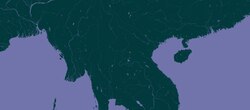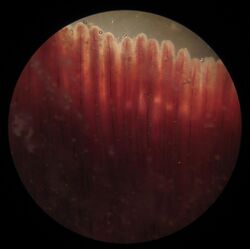Biology:Carassius praecipuus
| Carassius praecipuus | |
|---|---|
| Scientific classification Error creating thumbnail: Unable to save thumbnail to destination
| |
| Domain: | Eukaryota |
| Kingdom: | Animalia |
| Phylum: | Chordata |
| Class: | Actinopterygii |
| Order: | Cypriniformes |
| Family: | Cyprinidae |
| Genus: | Carassius |
| Species: | C. praecipuus
|
| Binomial name | |
| Carassius praecipuus Maurice Kottelat, 2012
| |

| |
Carassius praecipuus is a species of cyprinid found in the Nam Chat river in Xiangkhouang province in Laos. It has a compressed, moderately elongate body with a brownish-yellow coloration.[1]
Taxonomy
Its species name, praecipuus, is Latin for 'uncommon', alluding to the unexpected presence of a species of Carassius in the Mekong drainage. It was described by Maurice Kottelat in 2012.[1]
Distribution and habitat
It is only found in the Nam Chat river in Laos. However, it may also be present in nearby bodies of water in the Mekong drainage.[1]
Description
It is yellowish-brown in body color and reaches up to 62 millimetres (2.4 in) in standard length and 80.8 millimetres (3.18 in) in total length. It can be distinguished from other species of Carassius by its low count of dorsal fin rays (9-11 1⁄2), lateral line scales (25-27), and gill rakers (20-21).[1]
Behaviour
Reproduction and life cycle
Oocytes have been collected from a specimen in February, so it can be inferred that the species spawns at the end of the dry season or the start of the wet season. The specimen measured was the largest and measured 62 mm SL, so sexual maturity is presumably attained at this length.[1] Eggs of the closely related Carassius auratus hatch within 4-6 days,[2] so Carassius praecipuus eggs could be assumed to hatch quickly.
Feeding
Not much is known about the feeding behavior of the species. Carassius auratus consumes invertebrates and plant matter in the wild.[3]
See also
Carassius auratus
References
- ↑ 1.0 1.1 1.2 1.3 1.4 Kottelat, Maurice (January 2020). "Carassius praecipuus, a dwarf new species of goldfish from the Mekong drainage in central Laos (Teleostei: Cyprinidae)". Revue suisse de Zoologie 124 (2): 323–329. doi:10.5281/zenodo.893541. ISSN 0035-418X. https://bioone.org/journals/revue-suisse-de-zoologie/volume-124/issue-2/zenodo.893541/Carassius-praecipuus-a-dwarf-new-species-of-goldfish-from-the/10.5281/zenodo.893541.full.
- ↑ "Fish Species by Location - California Fish Website". https://calfish.ucdavis.edu/location/?uid=56&ds=698.
- ↑ "Carassius auratus, Goldfish - FishBase". https://www.fishbase.org.au/v4/summary/271.
Wikidata ☰ Q67183857 entry
 |


